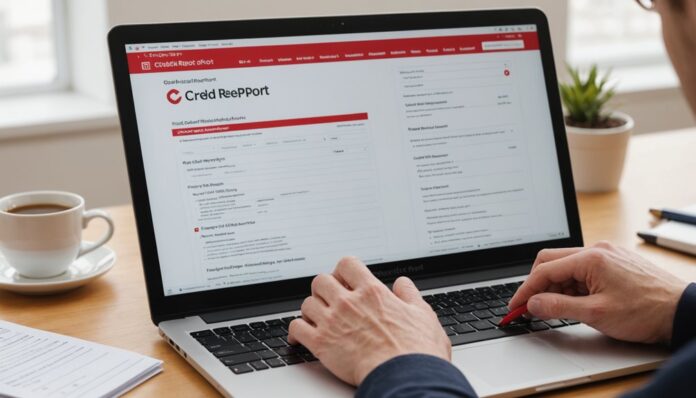Checking one’s credit report for errors is an important step in maintaining a healthy credit score. By obtaining a free annual report from the three major credit agencies, individuals can scrutinize their credit history for discrepancies. Inaccurate account details, outdated addresses, and unauthorized inquiries can greatly impact creditworthiness. Identifying and correcting these mistakes is vital, but many are unsure where to start, sparking a need for guidance on the process.
Highlights
- Obtain a copy of your credit report from AnnualCreditReport.com to review for errors and discrepancies.
- Verify personal data, account information, and credit inquiries to ensure accuracy and detect potential identity theft.
- Check credit account balances, payment history, and utilization ratios for errors or misreported information.
- Identify common mistakes, such as outdated personal information, incorrect balances, and unauthorized inquiries.
- Scrutinize every detail on your report to promote financial literacy and control over credit health.
Obtaining a Copy of Your Credit Report
Because checking a credit report regularly can help individuals detect identity theft and errors, the law requires the three major credit reporting agencies to provide consumers with a free copy of their credit report once a year.
This entitlement is a vital aspect of credit report basics. To obtain a free report, individuals can visit the website AnnualCreditReport.com, which serves as a centralized hub for requesting reports from Experian, TransUnion, and Equifax.
When requesting a report, individuals must provide their name, address, Social Security number, and date of birth to verify their identity. Obtaining reports is a straightforward process that enables individuals to monitor their credit activity, understand their credit health, and make informed decisions about their financial future.
Credit reports can be obtained in digital format for instant access.
Reviewing Your Credit Report for Errors
Upon receiving a copy of their credit report, individuals should thoroughly review the document to identify potential errors or discrepancies that may be detrimental to their credit health.
This evaluation is vital for maintaining a healthy credit score and promoting financial literacy. A careful examination of the report can uncover errors, such as inaccuracies in personal data, incorrect account information, or unauthorized inquiries.
Reviewing the report can also provide understanding into one’s financial standing, revealing areas where improvement is needed. It is essential to scrutinize every detail, including credit account balances, payment history, and credit utilization ratios.
A thorough review of the credit report enables individuals to take control of their financial well-being and guarantee the accuracy of the information.
Identifying Common Credit Report Mistakes
A thorough review of one’s credit report often reveals a range of errors that can have a significant impact on credit scores.
Common mistakes include misreported accounts, which can occur when incorrect information is reported to the credit bureaus, and incorrect balances, which can lead to inaccurate credit utilization ratios.
Outdated information, such as old addresses or employment data, can also cause issues.
In severe cases, identity theft can result in entirely false accounts being opened in one’s name, causing significant damage to credit scores.
Carefully reviewing each section of the credit report and verifying the accuracy of all information is vital to identifying these mistakes and taking corrective action.
Vigilance is essential in ensuring the report accurately reflects one’s credit history.
Disputing Errors on Your Credit Report
Reviewing one’s credit report is only the first step in ensuring the accuracy of the information it contains.
Disputing errors on a credit report involves initiating a formal dispute process with the credit reporting agency. The individual must identify the incorrect information, provide clear documentation to support the dispute, and submit it to the agency for review.
The agency is then required to investigate the dispute and take corrective action if necessary. Effective error resolution requires attention to detail, clear communication, and patience.
Individuals can dispute errors online, by phone, or by mail. The dispute process typically takes 30 to 60 days to resolve, after which the agency must notify the individual of the outcome and correct any verified errors.
Verifying Corrections to Your Credit Report
Following the resolution of a dispute, it is vital for individuals to verify that the corrections have been made to their credit report. This step guarantees that the errors have been rectified and the individual’s credit profile accurately reflects their financial history.
To verify corrections, individuals should contact the relevant credit reporting agencies and request an updated copy of their credit report. They should review the report carefully to confirm that the corrections have been made within the agreed-upon correction timeline.
If the corrections have not been made, individuals should follow up with the credit reporting agency to expedite the process. Verifying corrections is an important step in maintaining an accurate credit report and guaranteeing that credit scores are calculated correctly.
Conclusion
Checking one’s credit report for errors is a vital step in maintaining a healthy credit score. By obtaining a copy of the report, reviewing it thoroughly, and disputing any errors, individuals can guarantee that their credit information is accurate and up-to-date. Correcting mistakes can help improve credit scores and prevent potential financial repercussions. Regularly verifying the report’s accuracy is essential to confirm the corrections are made and the credit report remains error-free.

